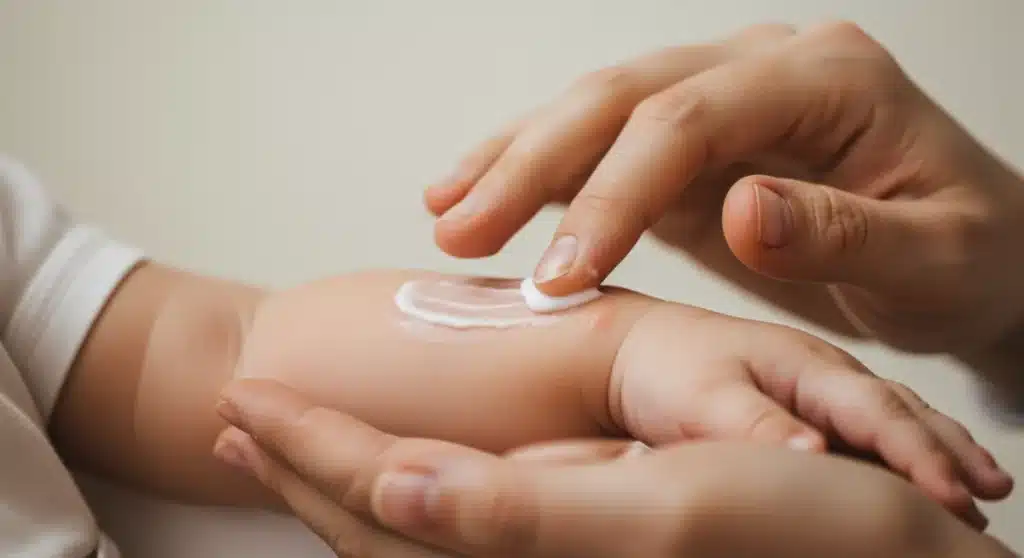Managing Baby Eczema: Effective Treatments & Skincare Tips

Advertisement
Effectively managing baby eczema involves understanding its triggers, implementing a consistent moisturizing routine, and utilizing appropriate treatments to soothe irritated skin and prevent flare-ups, ensuring comfort for your little one.
As a parent, witnessing your baby grapple with irritated, itchy skin can be incredibly distressing. If your little one is experiencing red, dry, or flaky patches, you’re likely navigating the challenges of managing baby eczema. This common condition, also known as atopic dermatitis, affects millions of infants, but with the right knowledge and consistent care, you can significantly alleviate their discomfort and improve their skin health.
Understanding Baby Eczema: What It Is and Why It Happens
Baby eczema is a chronic inflammatory skin condition characterized by dry, itchy, red patches. It often appears in the first few months of life, typically on the face, scalp, and the extensor surfaces of limbs, like elbows and knees. While it can be alarming to see, it’s not contagious and often improves as children get older.
Advertisement
The exact cause of eczema isn’t fully understood, but it’s believed to be a combination of genetic and environmental factors. Babies with a family history of eczema, asthma, or hay fever are more prone to developing the condition. Their skin barrier function may be compromised, leading to increased water loss and making it more susceptible to irritants and allergens.
Genetic Predisposition and Environmental Triggers
Genetics play a significant role in a baby’s likelihood of developing eczema. If one or both parents have a history of atopic conditions, the baby’s risk increases. This genetic link often means their skin has a weaker protective barrier, making it more permeable to moisture loss and external irritants.
- Family History: Increased risk if parents or siblings have eczema, asthma, or allergies.
- Skin Barrier Dysfunction: A genetic defect in the skin’s ability to retain moisture and protect against irritants.
Environmental factors can also trigger or worsen eczema flare-ups. These can range from harsh soaps and detergents to certain fabrics or even changes in weather. Identifying and minimizing exposure to these triggers is a crucial step in effective baby eczema management.
Advertisement
In conclusion, baby eczema stems from a complex interplay of inherited predispositions and environmental exposures. Recognizing these underlying factors is the first step towards developing an effective strategy for managing your baby’s delicate skin.
Essential Skincare Routine for Eczema-Prone Skin
A consistent and gentle skincare routine is the cornerstone of managing baby eczema. The goal is to keep the skin hydrated, protect its barrier, and minimize exposure to potential irritants. This involves careful choices in bathing, moisturizing, and everyday care.
Regular moisturizing is perhaps the most critical component. Emollients and moisturizers help to replenish the skin’s natural barrier, locking in moisture and reducing dryness and itchiness. Applying these products immediately after a bath is particularly effective as the skin is still damp, allowing for better absorption.
Bathing Best Practices for Sensitive Skin
Bathing an eczema-prone baby requires a delicate touch. While it might seem counterintuitive, short, lukewarm baths can actually be beneficial for hydration, provided the right products are used and moisturizing follows promptly.
- Lukewarm Water: Avoid hot water, which can strip natural oils from the skin.
- Short Baths: Keep bath times to 5-10 minutes to prevent over-drying.
- Gentle Cleansers: Use fragrance-free, soap-free cleansers specifically designed for sensitive or eczema-prone skin.
- Pat Dry: Gently pat the skin dry with a soft towel, leaving it slightly damp.
Immediately after patting dry, generously apply a thick emollient or moisturizer to seal in the moisture. This technique, often referred to as ‘soak and seal,’ is highly recommended by dermatologists for its effectiveness in hydrating compromised skin barriers.
Maintaining a diligent skincare routine, tailored to your baby’s needs, will significantly contribute to reducing eczema symptoms and improving their overall comfort. Consistency is key to seeing positive results and preventing future flare-ups.
Topical Treatments and Medical Interventions
While a robust skincare routine is vital, some babies may require additional topical treatments to control eczema flare-ups. These treatments are typically prescribed by a pediatrician or dermatologist and are used to reduce inflammation and itching during acute episodes.
Topical corticosteroids are the most common and effective medications for managing moderate to severe eczema. They work by reducing inflammation and suppressing the immune response in the skin. These should always be used as directed by a healthcare professional, as prolonged or improper use can lead to side effects.

Understanding Topical Corticosteroids
Topical corticosteroids come in various strengths, from mild to strong. Your doctor will prescribe the appropriate strength based on the severity and location of your baby’s eczema. It’s crucial to follow their instructions regarding application frequency and duration.
- Mild Steroids: Often used for mild flare-ups or on delicate areas like the face.
- Moderate to Strong Steroids: Reserved for more severe cases and typically for shorter durations.
- Application: Apply a thin layer only to affected areas, as directed.
In cases where corticosteroids are not suitable or sufficient, other non-steroidal topicals like calcineurin inhibitors (e.g., tacrolimus, pimecrolimus) may be prescribed. These medications work differently to reduce inflammation and can be particularly useful for long-term management or on sensitive skin areas.
Medical interventions for baby eczema are an important part of a comprehensive management plan. Always consult with a healthcare provider to determine the best course of treatment for your baby’s specific condition, ensuring safety and efficacy.
Identifying and Avoiding Eczema Triggers
One of the most impactful strategies for managing baby eczema is identifying and then diligently avoiding triggers that can cause flare-ups. These triggers can vary significantly from one baby to another, making careful observation and often a bit of detective work essential for parents.
Common triggers include certain fabrics, harsh detergents, environmental allergens, and even specific foods. Keeping a diary of when flare-ups occur and what your baby was exposed to can be incredibly helpful in pinpointing these culprits.
Common Environmental and Allergenic Triggers
Understanding the types of triggers that commonly affect babies with eczema can help parents proactively create a safer environment for their little ones. Minimizing exposure to these elements can significantly reduce the frequency and severity of flare-ups.
- Irritating Fabrics: Wool and synthetic materials can scratch and irritate sensitive skin.
- Harsh Soaps & Detergents: Fragrances, dyes, and strong chemicals in cleaning products.
- Dust Mites & Pet Dander: Common household allergens that can exacerbate eczema.
- Temperature Extremes: Both very hot and very cold, dry air can worsen symptoms.
Food allergies can also be a trigger for some babies with eczema, though this is less common than environmental triggers. If you suspect a food allergy, it’s crucial to consult with your pediatrician or an allergist before making any dietary changes, especially if your baby is breastfed or formula-fed.
By systematically identifying and avoiding your baby’s specific triggers, you empower yourself to take a proactive role in managing their eczema, leading to fewer flare-ups and greater comfort for your child.
Dietary Considerations and Probiotics for Eczema
The role of diet in managing baby eczema is a topic of ongoing research and discussion among medical professionals. While food allergies can certainly exacerbate eczema in some infants, it’s not a universal trigger, and broad dietary restrictions without medical guidance are generally not recommended.
For breastfed babies, a mother’s diet might occasionally impact eczema, though this is rare. If a specific food is strongly suspected, a healthcare professional can guide an elimination diet. For formula-fed babies, hypoallergenic formulas might be considered if cow’s milk protein allergy is suspected and confirmed by a doctor.

Exploring the Role of Probiotics
Probiotics, often referred to as ‘good bacteria,’ have garnered attention for their potential role in modulating the immune system and gut health, which some theories suggest could influence eczema development and severity. However, the evidence is still evolving.
- Gut-Skin Axis: The concept that gut health can impact skin conditions.
- Immune Modulation: Probiotics may help balance the immune response.
- Specific Strains: Research often focuses on particular strains like Lactobacillus rhamnosus GG.
While some studies have shown promising results, particularly in preventing eczema in high-risk infants, the overall evidence for using probiotics as a treatment for established eczema is mixed. It’s essential to discuss any probiotic supplementation with your pediatrician, as not all strains are equally effective, and dosage is important.
Ultimately, dietary interventions and probiotic use for baby eczema should always be approached with caution and under the guidance of a healthcare provider. They can help determine if these strategies are appropriate for your baby and ensure they receive adequate nutrition while exploring potential benefits.
Long-Term Management and Living with Baby Eczema
Managing baby eczema is often a marathon, not a sprint. While many children outgrow eczema by school age, some may continue to experience flare-ups into adulthood. Developing a long-term management plan is crucial for maintaining skin health and quality of life for your child.
This long-term plan involves ongoing vigilance with skincare, trigger avoidance, and knowing when to seek professional medical advice. It also includes educating yourself and your family about the condition to ensure consistent care.
Creating a Proactive Eczema Action Plan
A personalized eczema action plan, developed with your pediatrician or dermatologist, can be an invaluable tool. This plan typically outlines daily skincare routines, identifies specific triggers to avoid, and details how to manage flare-ups with prescribed medications.
- Daily Routine: Consistent bathing and moisturizing schedule.
- Trigger Log: Continuously monitor and record potential irritants.
- Medication Protocol: Clear instructions on when and how to use topical treatments.
- Emergency Contacts: Know when to call your doctor for severe flare-ups or signs of infection.
Living with baby eczema also means addressing the emotional impact on both the child and the family. Chronic itching can disrupt sleep, leading to irritability and stress. Seeking support from parent groups or mental health professionals can be beneficial if the condition significantly impacts family well-being.
By embracing a comprehensive and proactive approach to long-term management, you can help your baby live comfortably and happily, minimizing the impact of eczema on their daily life and fostering healthy skin habits for their future.
| Key Aspect | Brief Description |
|---|---|
| Skincare Routine | Consistent use of gentle cleansers and thick, fragrance-free moisturizers, especially after lukewarm baths. |
| Trigger Identification | Identify and avoid irritants like harsh soaps, certain fabrics, allergens, and extreme temperatures to prevent flare-ups. |
| Medical Treatments | Utilize prescribed topical corticosteroids or non-steroidal creams under professional guidance for inflammation. |
| Long-Term Plan | Develop a proactive action plan with a doctor for ongoing management, including daily care and flare-up protocols. |
Frequently Asked Questions About Baby Eczema
The best moisturizers for baby eczema are thick, fragrance-free emollients or creams, not lotions. Look for products specifically labeled for sensitive or eczema-prone skin. Examples include petroleum jelly, ceramide-rich creams, or those with colloidal oatmeal. Apply generously and frequently to maintain the skin barrier.
For some babies, certain foods can trigger eczema flare-ups, though this is not universal. Common culprits might include dairy, eggs, or nuts. If you suspect a food trigger, consult your pediatrician or an allergist before making any dietary changes. They can help identify specific allergens safely.
Bathing a baby with eczema daily is generally recommended, but it should be short (5-10 minutes) and with lukewarm water. Use a gentle, fragrance-free cleanser, and immediately after patting dry, apply a thick moisturizer to lock in hydration. This ‘soak and seal’ method is very effective.
You should see a doctor if your baby’s eczema is severe, not improving with over-the-counter treatments, or if there are signs of infection (redness, warmth, pus, fever). A pediatrician or dermatologist can provide an accurate diagnosis, prescribe stronger treatments, and rule out other conditions.
Many babies do outgrow eczema, often by the time they reach school age. However, some children may continue to experience flare-ups into adulthood. The severity and persistence vary greatly among individuals. Consistent management and care can help minimize its impact, regardless of whether it fully resolves.
Conclusion
Navigating the journey of managing baby eczema can feel overwhelming, but with consistent effort, informed choices, and professional guidance, you can significantly improve your baby’s comfort and skin health. From understanding the underlying causes and implementing a meticulous skincare routine to identifying and avoiding triggers, every step plays a crucial role. Remember to consult with healthcare professionals for personalized advice and treatment plans, ensuring your little one receives the best possible care. With patience and dedication, you can help your baby thrive despite the challenges of eczema.





